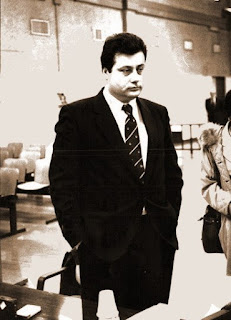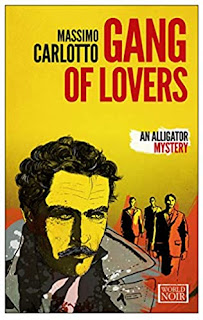NEW - Massimo Carlotto - novelist
Writer wrongly jailed for murder now best-selling author
Massimo Carlotto, the best-selling novelist who spent three years on the run, eight years in jail and a further 11 years clearing his name over a murder he did not commit, was born on this day in 1956 in Padua. Carlotto, who began his writing career in 1995 with a fictionalised autobiography, Il fuggiasco (The Fugitive), about his time on the run, is best known for his dark crime series featuring an unlicensed investigator, Marco Buratti, nicknamed L’alligatore (The Alligator), six of which have been published in English. The so-called Carlotto Case became one of the most controversial episodes in Italian legal history. It began in 1976, at the height of the period of intense political tension and unrest in Italy known as the Years of Lead, when the 19-year-old Carlotto, then a student, was a member of the ultra left activist group, Lotta Continua. In January of that year, according to his own testimony, he was cycling past the house in Padua where his sister, Antonella, had an apartment, when he heard the cries of a young woman in distress. He entered the building, discovered that the cries were coming not from his sister’s apartment but from that of her neighbour, the front door of which was wide open. Read more…
_________________________________________________________
Gorni Kramer - jazz musician
Multi-talented composer of more than 1,000 songs
The songwriter, musician and band leader Gorni Kramer was born on this day in 1913 in the village of Rivarolo Mantovano, near Mantua. An accomplished accordion and double bass player, Kramer later became a record producer, arranger and television writer. His embrace of the jazz and swing genres developed in spite of them being banned from being played on Italian state radio during the Fascist era. He was a prolific composer thought to have written more than 1,000 songs during a career that spanned 60 years. Kramer’s non-Italian sounding name led to a popular misconception that he was born in another country, yet it was his real name - reversed. He was born Francesco Kramer Gorni, so named because his father was a fan of the American cycling world champion Frank Kramer. It was from his father that Gorni inherited his passion for music, having played the accordion in his father’s band. Gorni studied double bass at the Conservatory in Parma and obtained his diploma in 1930. He began to work as a musician for dance bands, then in 1933, aged 20, formed his own jazz group. Read more…
_________________________________________________________
Palermo falls to the Allies
Capture of Sicilian capital triggered ousting of Mussolini
One of the most significant developments of the Second World War in Italy occurred on this day in 1943 when Allied forces captured the Sicilian capital, Palermo. A battle took place between General George S Patton’s Seventh Army and some German and Italian divisions but it was not a prolonged affair. The Sicilians themselves by then had little appetite to fight in a losing cause on behalf of the Germans and the invading soldiers were greeted by many citizens as liberators. It was not a decisive victory for the Allies but it had a symbolic value, signifying the fall of Sicily only 12 days after Allied forces had crossed the Mediterranean from bases in North Africa and landed at Pachina and Gela on the south coast of the island. In fact, the Americans and the British were still meeting German resistance around Catania and Messina in the northeastern corner of the island, although it would be only a matter of time before their resistance ceased. When news reached Rome that Palermo had fallen, the Fascist Grand Council, who had for some time given only uneasy support to Mussolini, knew that something had to be done to limit the damage of what now looked like an inevitable defeat for the Axis powers in Italy. Read more…
_________________________________________________________
Indro Montanelli – journalist
Veteran writer who cast a critical eye on Italian politics and society
A writer and journalist regarded as one of the greatest of 20th century Italy, Indro Montanelli, died on this day in 2001 in Milan. The previous year he had been named as one of 50 World Press Freedom Heroes by the International Press Institute. Montanelli had been a witness to many of the major events of the 20th century. He was in Danzig when Hitler rejected the ultimatum from Britain and France in September 1939. He was in the streets of Budapest in 1956 when Soviet tanks rolled in and he was shot in the legs by Red Brigades terrorists on an Italian street in 1977. Montanelli was born Indro Alessandro Raffaello Scizogene Montanelli in 1909 at Fucecchio near Florence. He studied for a law degree at the University of Florence in the early 1920s and began his journalistic career by writing for the Fascist newspaper, Il Selvaggio. He then worked as a crime reporter for Paris Soir before serving as a volunteer with Italian troops in the Eritrean Battalion in Ethiopia - Abyssinia as it was then - where he wrote war reports which later formed the basis for the first of his 40 books. It was a book that honestly conveyed what Montanelli had seen, some of which caused him to change his mind about Benito Mussolini, the Fascist leader. Read more…
_________________________________________________________
St Lawrence of Brindisi
Talented linguist who converted Jews and Protestants
St Lawrence of Brindisi was born Giulio Cesare Russo on this day in 1559 in Brindisi. He became a Roman Catholic priest and joined the Capuchin friars, taking the name Brother Lawrence. He was made St Lawrence in 1881, remembered for his bravery leading an army against the Turks armed only with a crucifix. Lawrence was born into a family of Venetian merchants and was sent to Venice to be educated. He joined the Capuchin order in Verona when he was 16 and received tuition in theology, philosophy and foreign languages from the University of Padua. He progressed to be able to speak many European and Semitic languages fluently. Pope Clement VIII gave Lawrence the task of converting Jews living in Rome to Catholicism because of his excellent command of Hebrew. Lawrence also established Capuchin monasteries in Germany and Austria and brought many Protestants back to Catholicism. While serving as the imperial chaplain to the Holy Roman Emperor, Rudolph II, he led an army against the Ottoman Turks threatening to conquer Hungary armed only with a crucifix and many people attributed the subsequent victory to his leadership. Read more…














